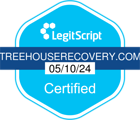There are a myriad of new and potentially effective medicinal treatments for sufferers of Substance Use Disorder. For example, Campral is a relatively new medication that is prescribed for alcoholics who are new in sobriety and it’s benefits are described as helping to lessen the effects of cravings. While Campral has not made its way to a ubiquitous presence in addiction medicine, there is a newer medication being used as a preventative measure within the realm of opiate addiction. This medication is known as Vivitrol and can be also taken in a pill form daily which is called Naltrexone. Vivitrol is typically injected one time per month and it is used to prevent relapse into opiate addiction. What is interesting about Vivitrol is that, unlike Campral which is used to lessen cravings, it is actually used to block the effects of opiates if they are ingested or used intravenously.
If we think of our brains as having receptors, or slots in which we can put a key, we can think of drugs, alcohol, and opiates in this example, as the keys that fit into the key slot. Assuming the right key fits into the right slot, the consequence of this mechanism is the manifestation of feeling euphoric, in other words, feeling high. What Vivitrol and Naltrexone do, however, is to mimic an “opiate key” so that it fits in the opiate receptor slot, which essentially renders that opiate slot useless. Because the Naltrexone now inhabits those slots in which opiates would have “locked in” before, the individual who is taking Vivitrol or Naltrexone can actually use opiates without experiencing any high or euphoria. The logic follows that if we can commit to taking a Naltrexone pill daily, or a monthly Vivitrol injection, we will be able to protect ourselves against the possibility of relapse. These medications essentially act as a final barrier in the event that all our strategies for preventing relapse break down.
There is a movement in the US that is gaining steam which says that providers who do not offer this medication are risking malpractice. Proponents of these medications say that they provide a sense of comfort and stability during the most crucial first months of recovery when relapse in most common. Skeptics, on the other hand, say that this approach creates an illusionary state whereby the addicts begin to depend on these medications for sobriety, and that the workload that is required in order to create a new and better life is lightened which can cause greater damage over the long run.
Tree House Recovery of Orange County, California is a premier men’s addiction treatment facility that uses eight different modalities to help our men become the best versions of themselves they can be. We teach our men that every day of their journey is something to celebrate, and that recovery isn’t a sprint– it’s a marathon. To get started with Tree House Recovery, call us today at (855) 202-2138.







